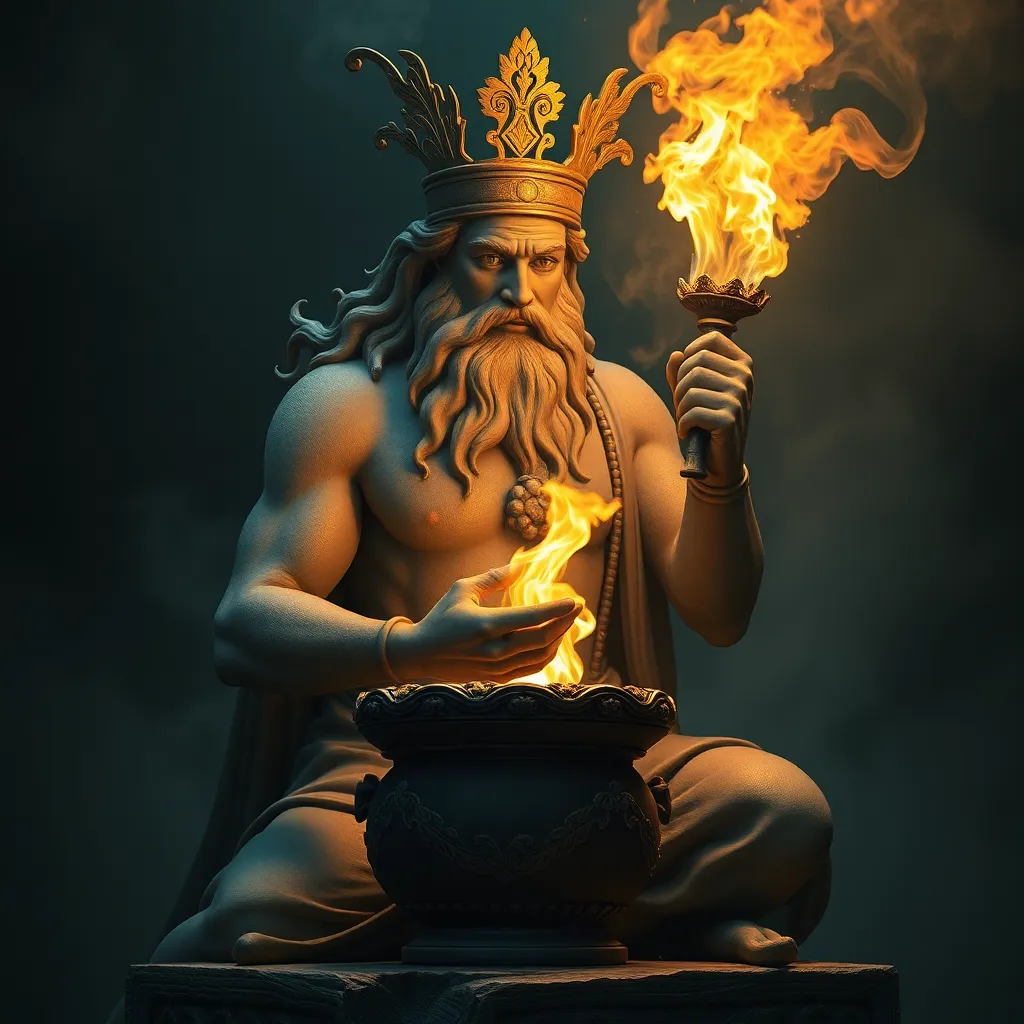Hephaestus and the Concept of Divine Inspiration in Craft
I. Introduction
In the rich tapestry of Greek mythology, Hephaestus stands out as the god of craftsmanship, fire, and metalworking. Known for his unparalleled skills in creating beautiful and functional works of art, Hephaestus embodies the essence of divine inspiration. This article aims to explore Hephaestus as a symbol of craftsmanship and the concept of divine inspiration, emphasizing his importance in the creation of art and craft.
II. The Mythological Background of Hephaestus
Hephaestus, the son of Zeus and Hera, was unique among the Olympian gods; he was not only a deity but also a master craftsman. According to myth, Hephaestus was born with a physical deformity, which led him to be cast out of Olympus. However, despite his challenges, he became the embodiment of skill and creativity.
A. Birth and attributes of Hephaestus
Hephaestus’s birth is often described as a tale of rejection. Hera, ashamed of his deformity, threw him from Olympus, resulting in his lameness. Despite this, Hephaestus is attributed with various skills:
- Metallurgy
- Blacksmithing
- Architecture
- Jewelry making
B. His role among the Olympian gods
Hephaestus served as the blacksmith of the gods, creating their weapons and armor. His creations were not only functional but also imbued with divine beauty and significance. He was married to Aphrodite, the goddess of love, which further highlighted his association with beauty and artistry.
C. Comparison with other gods associated with creativity and craft
While Hephaestus is the god of craftsmanship, other deities such as Athena (goddess of wisdom and war) and Apollo (god of the arts) also hold significant roles in the creative process. However, Hephaestus’s unique focus on physical craftsmanship sets him apart.
III. Hephaestus as the God of Craftsmanship
Hephaestus’s skills and inventions have left an indelible mark on Greek mythology. His mastery over materials and techniques is a testament to the divine inspiration that guided his work.
A. Overview of Hephaestus’s skills and inventions
Hephaestus was renowned for his exceptional creations, including:
- The armor of Achilles
- The shield of Heracles
- Golden automatons that served the gods
B. The significance of fire and metalwork in his creations
Fire, a symbol of transformation and creativity, played a crucial role in Hephaestus’s work. The ability to manipulate metal through heat not only showcased his craftsmanship but also represented the divine spark of inspiration that fueled his creations.
C. How his craftsmanship reflects divine inspiration
Hephaestus’s work is often seen as an extension of divine will. His ability to craft extraordinary items reflects the notion that true artistry is not merely a human endeavor but a manifestation of divine inspiration.
IV. Divine Inspiration in Ancient Greek Art
In ancient Greece, the concept of inspiration was deeply intertwined with artistry. Artists believed that their creative abilities were gifts from the gods, particularly from Hephaestus.
A. The concept of inspiration in Greek culture
Divine inspiration was viewed as a form of guidance that artists received from the gods, leading them to create works that transcended the ordinary.
B. The relationship between gods and artists
Many artists sought the favor of Hephaestus for their craft. They believed that by honoring him, they would receive the inspiration necessary to create masterpieces.
C. Examples of divine influence on artists in ancient Greece
Some prominent examples include:
- The sculptures of Phidias, who was said to be inspired by Athena.
- The pottery of Exekias, which reflects the influence of Hephaestus.
V. Hephaestus’s Tools and Techniques
Hephaestus’s workshop was legendary, filled with tools that symbolized his divine craftsmanship.
A. Description of the tools used by Hephaestus
His tools included:
- Anvils
- Hammers
- Bellows for the forge
- Various molds for casting
B. The symbolism of these tools in relation to divine inspiration
Each tool represented a different aspect of creation, embodying the idea that craftsmanship is a divine act. The hammer symbolizes the force of creativity, while the anvil represents the foundation of skill and technique.
C. How these techniques influenced ancient craftsmanship
Hephaestus’s techniques set a standard for ancient craftsmen, influencing generations of artisans who sought to emulate his divine skill.
VI. Case Studies: Hephaestus’s Creations
Hephaestus is credited with numerous legendary creations that exemplify divine inspiration.
A. The creation of the armor for Achilles
In the “Iliad,” Hephaestus forges magnificent armor for Achilles, symbolizing not just protection but also the artistry that comes from divine inspiration.
B. The construction of the automatons
Hephaestus created golden automatons that served as helpers for the gods, showcasing his ability to blend art with functionality.
C. Analysis of how these creations embody the idea of divine inspiration
These creations reflect a perfect harmony of beauty, utility, and divine intervention, further solidifying Hephaestus’s role as a symbol of craftsmanship.
VII. The Legacy of Hephaestus in Modern Craftsmanship
The influence of Hephaestus can still be felt in contemporary art and craftsmanship.
A. Influence of Hephaestus on contemporary artists and craftsmen
Many modern artisans look to Hephaestus as a source of inspiration, embodying the dedication to craft and creativity that he represents.
B. The enduring symbolism of divine inspiration in modern creative practices
Today, the notion of divine inspiration continues to resonate with artists, who often seek a deeper connection to their craft.
C. Examples of modern interpretations of Hephaestus’s legacy
From sculpture to metalwork, contemporary artists draw on Hephaestus’s legacy, reinterpreting his themes in their own unique styles.
VIII. Conclusion
Hephaestus’s significance in mythology as the god of craftsmanship highlights the timeless connection between divine inspiration and the creative process. His legacy endures in the hearts of artisans today, reminding us that creativity is often a divine gift, guiding us to create works of art that transcend the ordinary.
In reflecting on the impact of Hephaestus, we recognize that the spirit of divine inspiration continues to inspire artisans and craftsmen, fostering creativity in all its forms.




